QuestionHi there. I have a 5.5 months old male labrador retriever who currently weighs 27 kilos. I got this dog when he was 45 days old and ever since, he has been living with my family in our apartment. He has never been left alone and never been crate trained. He got used to be sleeping by my bed. I have only been feeding him with Purina Pro Plan puppy dry food 3 times per day according to the manufacturer's instructions. I have read many articles about labradors, and I have always tried to teach him obedience by correcting his mistakes with a loud "No" etc. However, its seems that nothing works. I have never hit him. He really has a lot of attention and love from all the family. Since this is my first pet, I have a number of questions for you:
1. He has been used to doing his business on the balcony. Now he can hold onto it for 8-9 hours and sometimes even more. I do take him for long walks (30-45 minutes) 3 times per day. First, I take him out for a 30 minutes walk as soon as he wakes up, around 0630 hrs. He does not eliminate outside, but as soon as we get back home, he eliminates on the veranda. I guess he is still scared of eliminating outside. The only thing he does while outside is sniffing and picking up whatever he finds in his mouth. What can I do?
2. He really pulls a lot on the leash and gets crazy whenever he sees something moving (animals, people, etc.). What can I do?
3. Whenever I try to pet him, showing him love and affection with hugs etc., the only thing he does is biting my hands and sometimes really strong. I do leave him alone for some time just to show him that this is wrong, but it hasn't worked out. He has plenty of toys around him. What can I do?
4. Every time I try to get something out of his mouth, something he picked up from the road, he gets aggressive and on a few occasions he has bitten my fingers. I always correct him by yelling at him "No" and "Ouch" and never showed him that I am afraid of him, but this hasn't worked either. What can I do?
5. Although he looks and acts very healthy, I do have my concerns about his weight. He looks like he is going to be a big dog even though he is still about 55 cm in height. What is the ideal weight for a lab at his age?
6. As I mentioned, he has never been left alone. Even when I am in the house, he always follows me anywhere I go. How could I work on leaving him alone at the house?
7. I am really confused as to what is the ideal diet for a dog. Feeding him with only dry food is ok, or should I add something into his diet? Lately, he has been shedding a lot, and I started giving him Omega 3 supplements. Is there something else I can do?
8. His poop early in the morning seemed very dry lately, and upon directions from the vet, I started giving him "tufalac" supplements. Is there anything else I could do?
As you can see, I do care a lot about my dog, and my main concern is his good health and behavior. I would really appreciate if could could offer me any kind of advice. Thanks in advance.
Christos
AnswerI'll do my best to answer all your questions.
1. The dog eliminates on the balcony because that's where you taught it to go. Stop allowing him to go out there, and you may need to start house-training from scratch again, by going out more times a day when possible so the dog learns that he must potty outside and not on the balcony. You may have a few inside accidents, but you will just need to teach the dog that he needs to go outside on the walks.
2. Obedience training will help with the pulling on the leash. If you don't anywhere to enroll in classes, you can do searches online for instructions. For example, this is one site. http://www.medicinenet.com/pets/dog-health/teaching_dogs_not_to_pull_on_leash.ht...
3. Puppies bite. You will need to redirect the dog's attention to an appropriate toy or stop playing with him when he gets overly excited. He will eventually learn to stop. Just for future reference, in the USA we do not sell puppies before 8 weeks because they learn valuable lessons from the mom and littermates such as bite inhibition. Typically, getting a pup at 45 days is too young and it's normal to have problems with biting when you get them that young. this article might help in training.
http://www.knowingdogs.com/Images/Teaching%20Pups%20Bite%20Inhibition.pdf
4. Once you have gotten further with the training, you will find it easier to remove things from his mouth. It goes back to the training you need to do to stop the biting. Once he is older and more trained, he won't bite when you need to take something from him.
5. There is no ideal height and weight for a lab since it all depends on pedigree, parents, what you feed, etc. My last pups were about 50 pounds at 5 1/2 months. You wouldn't want your much heavier, but you could see a dog about 40 pounds, and have them still be OK. A lab shouldn't be bigger than 24 1/2 inches at the withers. They may end up bigger depending on the pedigee. It's not common to have them at about 20-21 inches at 5-6 months of age.
6. Crate training is wonderful for teaching a dog to be alone in the house, plus it keeps them safe. If you can't do that, I would start by leaving the dog alone for 15 minutes at a time in a smaller room that is dog-safe. We crate train in the USA, and I did not let my young dogs be free in the house when I wasn't home until they were well past 1 year old. Honestly, I think 5 1/2 months is too young to teach them that. A small room will definately work, but make sure the dog has some safe toys otherwise, he could chew the walls and furniture.
7. Dry food is fine. You CAN add other things like healthy meats and vegetables that might be left over from dinner. Labs will shed big two times a year and that might be what you are experienced. The omega supplements might help. Pro Plan is a good food. Do you have access to Pro Plan Selects with the Salmon? Or Pro Plan Performance? They have higher fat which should help with the coat.
8. I don't know what Tufalac is. You can add water to the dry kibble each meal to give the dog more moisture in his diet.

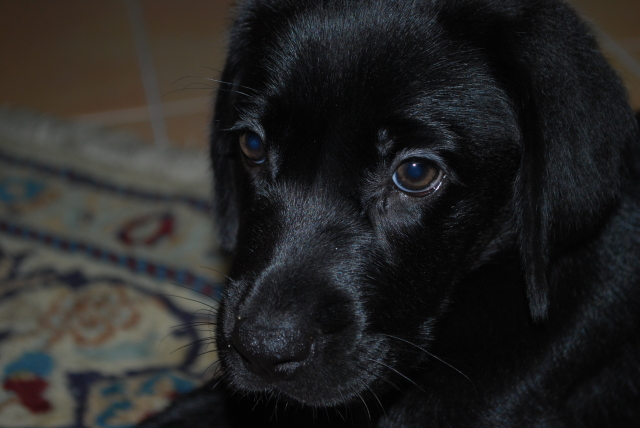 Labrador behaviour
Question
Gordie
Name: Gordie
Age: 4 months
Sex: Male
N
Labrador behaviour
Question
Gordie
Name: Gordie
Age: 4 months
Sex: Male
N
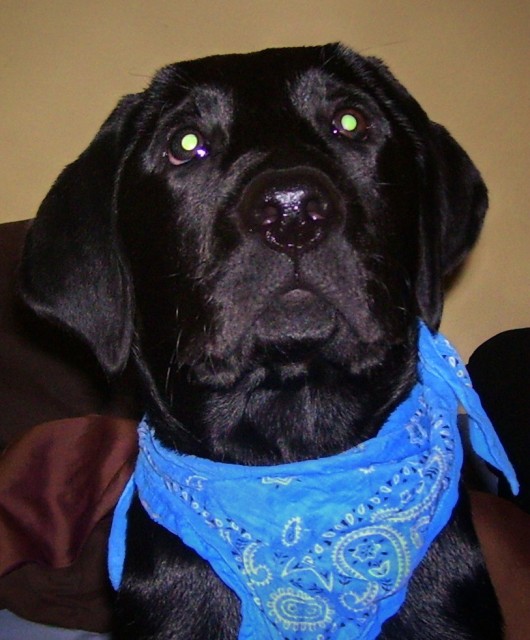 Eating Problems
Question
Datsun
I have a 9 month old,Black male Labrado
Eating Problems
Question
Datsun
I have a 9 month old,Black male Labrado
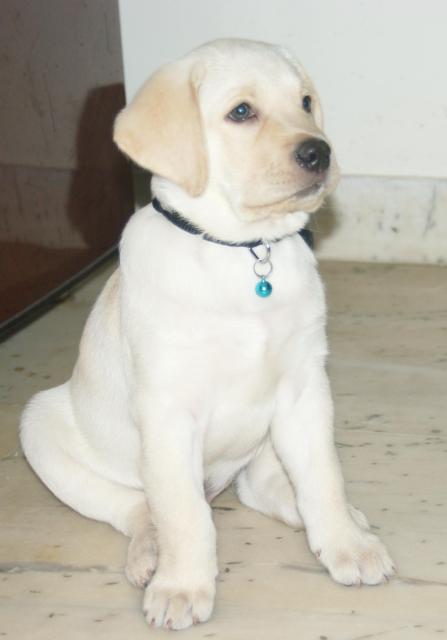 Need opinion about my Labrador Retriever
QuestionCoco (Labrador Retriev
QUESTION: I have
Need opinion about my Labrador Retriever
QuestionCoco (Labrador Retriev
QUESTION: I have
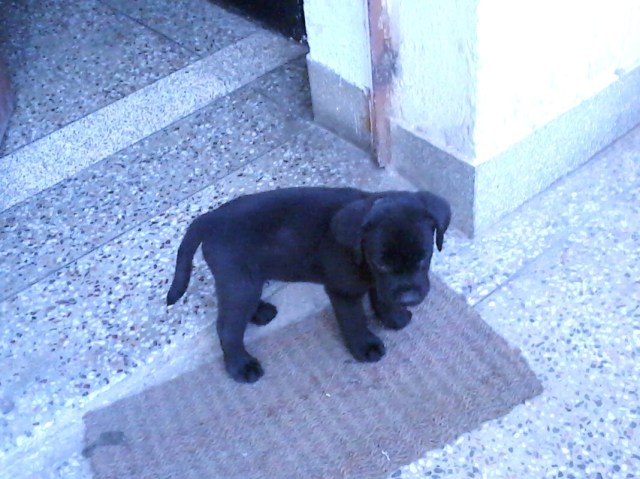 labrador diet
Question
striker
i have a black male Labrador of 4 mont
labrador diet
Question
striker
i have a black male Labrador of 4 mont
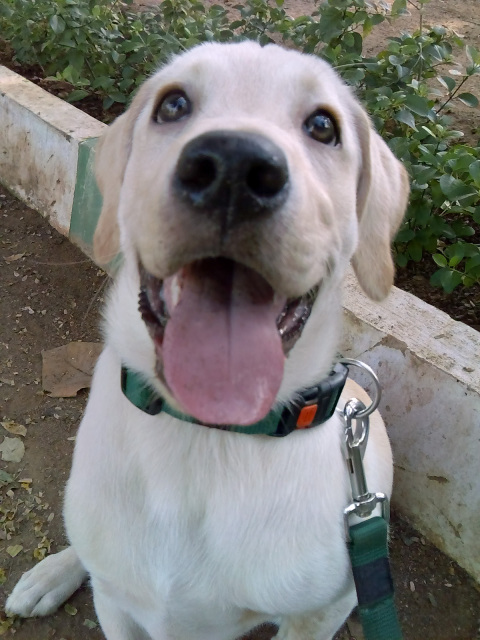 Hyper active Labrador Pupp.
Question
Benji
Hello Jen,
&nbs
Hyper active Labrador Pupp.
Question
Benji
Hello Jen,
&nbs